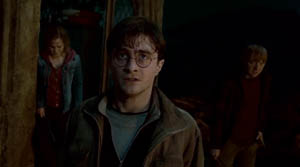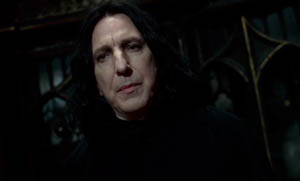|
All sense of waiting is over. The final installment in the Potter series straps a cinder block to the gas pedal and more or less leaves it there, in a film that's short on plot if still long on detail. For most of its running time, the film gets by on sheer adrenaline, with the quest to destroy the three remaining pieces of Voldemort's soul having been definitively set up at the end of Half-Blood Prince. After Deathly Hallows part 1 became the Harry Potter film I didn't even realize I'd wanted to see until I saw it, this second half feels rather conventional, if still effective. A few elaborate plot convolutions remain, but this is first and foremost an action story, as all-out war finally breaks out between the good wizards and Voldemort's Death Eaters. Considering the massive narrative debts incurred thus far, this story effectively pays off most of them before the credits finally roll. A few questions remain, such as why Harry's aunt and uncle perpetually treated him like a plague rat, or, for that matter, why Voldemort himself is such a disagreeable asshole. Others, such as the ultimate motives of Professor Snape, pay off richly and are among the franchise's best moments. And it is a relief, in many ways, to find that ultimately Harry isn't nearly as special as everyone always assumed; it does much more in the way of creating empathy than the previous messianic overtones could've allowed for. 
As with every film in the series starting with Goblet of Fire, Deathly Hallows part 2 requires that those who've not read the novels be a smidge forgiving over the fact that they aren't going to understand everything that happens. We meet Dumbledore's estranged brother Aberforth, who has some connection to the shard of mirror Harry carries in this film and the previous one. Some explanation occurs, which flies by as if duct-taped to a bullet; I confess that I still don't know what the mirror, or for that matter Aberforth, is doing in the movie beyond satisfying hardcore fans. The part is such a small one that it seems, beyond invoking the wrath of the faithful, that there would be no harm done in leaving him out entirely and devoting the time elsewhere. A few character deaths are obviously meant to inspire pathos, and instead provoke reactions more akin to "Alas, we hardly knew ye." The titular Hallows, in particular, have a role that is obviously important but underexplained. The books aside, the film is likely to be challenging for those with only a passing familiarity with the film series. Remember the five seconds of Half-Blood Prince spent on Dumbledore's wounded hand? You'd better. This being the case, it's impressive how well the film still works as a visceral exercise. With such a weighty history behind it at this point, it's gratifying simply to see the ever-looming sense of impending doom at last crest the horizon and find our panopoly of heroes standing firm in its path. The disparity between teachers and students has narrowed sharply, as the kids we've known for so long now stand shoulder-to-shoulder with their former mentors and, at times, outperform them. While it's still primarily Harry's story, nearly everyone gets a chance to shine; what once seemed like the story of one specially chosen savior has become one of solidarity in the face of oppression, and a celebration of the power of youthful courage and determination. That this is nothing new is hardly the point; the point is that, when done properly, as it is here, it's among the most enjoyable kinds of stories. 
The whole shebang wraps up in a way that's satisfying, if not particularly surprising; I'd have been tantamount to shocked had it ended in a significantly different way. There's an undeniable melancholy attached to the very fact of an ending after so much time, even for a film series I didn't begin paying close attention to until its sixth installment. One wishes it was possible to send director David Yates back in time and give him the job of directing Sorcerer's Stone. Flashbacks seen herein interpolate scenes from that first movie, and yet my brain all but refuses to accept it as part of the same story as this. Yates understands that magic can be wondrous without becoming comedic whimsy, which is why the finale plays as a story of perseverance and pain and noble self-sacrifice, and not like spending two-plus hours watching an amusement park throw up. At the same time, I couldn't help but feel that it would've been terribly amusing if all of Dumbledore's more distant flashback scenes had featured a digitally recreated Richard Harris, just for continuity's sake. It's probably a good thing, then, that Yates has more sense than that. -review by Matt Murray
|
|
||||||||